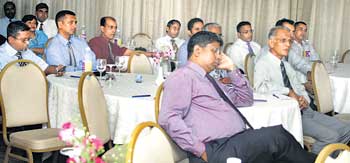
Sri Lanka could have done 10 times better
The ‘pure blues’ (SLFP) and ‘pure greens’ (UNP) have shown more growth than the ‘red blues’ (SLFP/JVP) and ‘blue-greens’ (SLFP-UNP under Chandrika Kumaratunga) who have governed this country over the past 60 years, according to Dr. Harsha de Silva, Lead economist LIRNEasia. Speaking on ‘Economic Direction 2008, 60 years on, Are we on the right track’ at The Sunday Times Business Club’s monthly meeting, he noted that the past 60 years of economic and political history has accumulated much baggage. “The objective of economic development is to have economic growth, high and sustained with equitable distribution. The economic growth has not been sustained,” he pointed out. He noted that since independence the public investment has by and large been below 5 percent. “When the economy opened up in 1977, private investment surged. However we have only been ‘flirting’ with 8 percent growth and 35 percent investment of gross domestic product (GDP), but this is not enough,” he stressed. He noted that during the last 60 years of investment, the country has saved only in 1953. “The problem is that a wider budget deficit cuts the domestic savings rate, increasing the amount of capital in the country will need from overseas to sustain economic growth,” he said. De Silva referred to bad resource allocation as one of the primary issues with regards to this. “Efficiency in allocating resources or apportioning goods and services to consumers is bad.” He said that large shares of factors of production such as land and buildings are ‘stuck’ in unproductive ways restricting growth and development. “Nearly 80 percent of the land is either owned or controlled by the state. Some 60 institutions own or control these lands. The 1972 land reforms put a ceiling on private ownership,” he said. De Silva noted that labour markets could have done better. “They are highly politicised and there are excessive wage distortions that remain. There is state domination of the banking sector and the private banks are exploiting the inefficiency of state banks.” However he noted that with all the drawbacks, the country has not done badly. “We do not see object poverty, but we could have done 10 times better,” he said. He said that inflation is the highest in the region. “It is out of control. However, all is not bad as our external position is improving. The balance of payments is improving, exports are trending up and commodity prices are up. There are strong net private remittances. But this is part real and part mirage.” De Silva said that the country needs urgent public sector reforms. “The government is ‘huge’. We need greater efficiency to reduce overlap, stop adding new institutions and have reforms in selection and recruitment.” He stressed that Sri Lanka is not a failed state, but ‘we have squandered our initial advantage and messed many opportunities along the way.’ “Our immediate future is war and we are gambling with the future with short-term foreign borrowings. If the war does not end soon and reforms do not happen, the economy will face serious problems.” The meeting was held at the Cinnamon Grand, Colombo, the club’s host hotel. |
|
||||||
|
||||||
| || Front
Page | News
| Editorial
| Columns
| Sports
| Plus
| Financial
Times | International
| Mirror
| TV
Times | Funday Times || |
| |
Reproduction of articles permitted when used without any alterations to contents and the source. |
© Copyright
2008 | Wijeya
Newspapers Ltd.Colombo. Sri Lanka. All Rights Reserved. |
